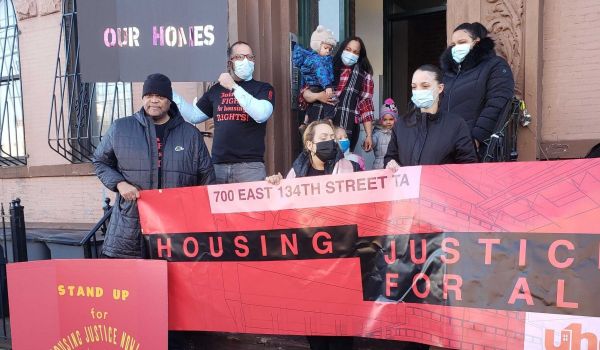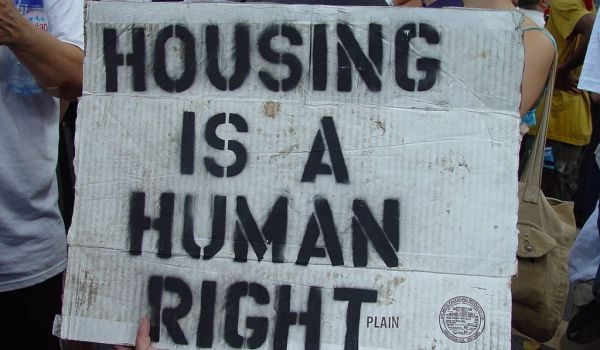Jersey City is on the verge of passing a Right to Counsel bill which could be among the strongest in the nation. The bill, which would guarantee an attorney to all low-income tenants in housing court, would be a boon for tenants in the rapidly gentrifying city, which shares a rental market with neighboring New York City.
Two ordinances creating a new Right to Counsel program and creating new fees on development to fund passed the Jersey City council on May 24. The first bill allows tenants in eviction proceedings who make 80% of the Area Median Income to receive a pro bono attorney. It would also allow attorneys to represent tenants facing illegal rent increases and failure to maintain services.
A final vote on both bills is scheduled for June 14.
“We have to keep people in their homes,” says Councilmember James Solomon, who co-sponsored the bills. “And I think the research clearly demonstrates that Right to Counsel keeps people in their homes.”
According to the National Coalition for a Civil Right to Counsel, tenants in the U.S. have attorneys in 3% of eviction cases, while landlords have attorneys in 82% of cases. A Right to Counsel movement has surfaced in recent years to change that calculus; so far, it’s reached 15 cities, four states and one county, according to the coalition.
Last year, that campaign reached Jersey City, which has seen high demand for rentals in the past 10 years stemming from overflow from New York, which struggles with its own affordability crisis. While the city experienced a building boom, it has failed to reign in fees from developers as is permitted under New Jersey state law.
“Jersey City has built six times the housing than New York City on a per-person basis,” says Solomon. He believes that Right to Counsel legislation is necessary because of the impact that New York City’s housing policies have had on his constituents. “Despite the incredible increase in our housing supply, our rents have still gone through the roof, because the New York metro region continues not to build nearly enough housing. And so we feel a need and imperative to put policies in place to address eviction and displacement in Jersey City.”
The paired bill will establish two development taxes on residential and non-residential development, which will go to a new city Affordable Housing Fund.
“From the very beginning, we wanted to look for a funding mechanism that wouldn’t raise taxes on everyday people,” says Julia Tache with the Right To Counsel Jersey City coalition. They also wanted the funding to come from actors that they believe are responsible for the housing crisis.
A spending plan still needs to be formalized. Eventually, advocates intent, “of every five dollars we collect through the development fee, one dollar will go to the Right to Counsel program and four dollars go to the city’s affordable housing,” Solomon explains. A large portion of those affordable housing funds will go to emergency rental assistance, he says.
The organizing campaign for Jersey City’s Right To Counsel was proposed by the Hudson County branch of the Democratic Socialists of America. During a prior electoral campaign, the group had learned that one of the main issues that constituents brought up was a lack of affordable housing. The group launched the campaign in July 2022, and were soon joined by Make The Road New Jersey, Jersey City Mutual Aid Society, the National Coalition to a Civil Right To Counsel, ACLU New Jersey and others.
When they approached the city council in the fall and proposed the bill, several councilmembers adopted it as co-sponsors.
The ordinance would establish a new “Division of Tenants’ Right to Counsel” within the Department of Housing, Economic Development and Commerce by 2026. Property owners would have to notify tenants of the availability of attorneys in every lease, upon making rent demands or when initiating eviction proceedings. The bill also lays out a tenant review board to make sure the program is serving those who need it.
A separate ordinance would establish a new fee for residential development. Beginning July 31, developers would have to pay 0.5% of the assessed value of the land for new construction; for demolitions and remodels, the fee is paid on the difference between the previous value of the land and the assessed value after the remodel. That fee will rise annually to 1.5% by July 2025. Developers can be exempt by building affordable housing on site.
The law sets up a new Affordable Housing Trust Fund for these development taxes, but does not establish a spending plan, which has to be submitted to New Jersey Superior Court within a year of the law passing.
Fair Share Housing, a statewide affordable housing nonprofit that enforces the state’s court-mandated affordable housing requirements, determined that the Affordable Housing Trust Fund could only go to support tenants making 80% of the area median income or less to comply with New Jersey law. The program could eventually expand to people making more than 80% of AMI, but attorneys for anyone earning above that threshold can’t be funded by the newly-created development fees.
The ordinance also reallocates some funding from an existing fee on non-residential (commercial, retail and industrial) development to the newly-created Affordable Housing Trust Fund.
Every city in New Jersey already collects taxes for non-residential development as the result of a 1990 court decision. By law, these non-residential development fees go to a state affordable housing fund unless the municipality creates a plan for spending them on its own affordable housing needs, something Jersey City had not done until now.
Jersey City will need to build on the lessons from New York City’s Right To Counsel legislation, which was the first in the nation but has since been hobbled due to the quickening pace of eviction filings and the attrition of overworked attorneys. Advocates rallied in Brooklyn on May 31 calling on courts to slow down eviction proceedings until tenants could be paired with attorneys. An attempt to pass a statewide Right To Counsel in New York before the end of the legislative session in June also floundered.
Tache said that fairly compensating attorneys is a priority for the Jersey City program. Pay raises for New York City’s Right to Counsel staff were delayed and, along with the overwhelming load of cases, remain a sticking point that makes it challenging to recruit attorneys.
“For us, it was really important when we were creating our additional budget and our spending plan to make sure that we were listing salaries that were competitive to other public service lawyer or legal positions to make sure that we weren’t underpaying staff,” Tache says.
Councilmember Solomon says addressing staffing and recruitment issues will be part of the role of the director of the newly-established Right to Counsel office.
“There’s nothing we built into the text of the ordinance to address it, but it is a thing that we’re aware of and are going to want our director to develop a plan on how to address it,” he says.
Service providers have not been chosen yet, but the city will eventually put out a request for proposals if legislation passes.
While advocates are optimistic about the law’s passage, detractors have been making their critiques heard.
In an op-ed for NJ.com, Wendy Paul, head of the Jersey City Apartment Owners Association, suggests the ordinance is inherently bad because it would require hiring lawyers. “The council members sponsoring this ordinance have decided that employing lawyers is more important than the real issues facing Jersey City tenants,” Paul writes. She continues, inaccurately: “Not one dime will go to rent assistance, job training, job creation, or even stopping evictions. Lawyers cannot prevent evictions. If a tenant cannot pay rent, even the most successful lawyer can only forestall an eviction action for a short period of time.”
Attorneys can in fact prevent evictions, particularly frivolous evictions, and the evidence to support this fact is fairly robust. In New York City, Right to Counsel attorneys were covering 71% of tenants in housing court, and those tenants were able to avoid eviction 84% of the time.
And the Affordable Housing Trust Fund is planned to provide emergency rental assistance as well as the funding the construction of new housing. While apportionment of the trust fund has to be done in a separate spending plan subject to judicial review to comply with the law, attorneys and advocates say rent subsidies are planned to be part of the fund.
Paul and other landlord lobbyists believe the new fee would raise the cost of building and that fees would be passed on to tenants in the form of rent increases. But such development fees are not just common in New Jersey, due to the nearly 50-year-old Mount Laurel requirements, but they are also in many cases mandatory; evidence has shown that they can successfully lead to new affordable housing.
“Obviously, these companies are going to try to lobby against something that will impact their profits,” Tache says.
This story was co-published in collaboration with Shelterforce, the only independent, non-academic publication covering the worlds of affordable housing, community development and housing justice. We’ve updated this story to correct Tache’s quotes for accuracy.
This article is part of Backyard, a newsletter exploring scalable solutions to make housing fairer, more affordable and more environmentally sustainable. Subscribe to our weekly Backyard newsletter.

Roshan Abraham is Next City's housing correspondent and a former Equitable Cities fellow. He is based in Queens. Follow him on Twitter at @roshantone.


















